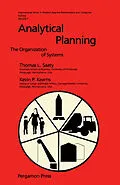Analytical Planning: The Organization of Systems deals with systems and planning and suggests a methodological tool for integrating the two. This book presents the basic ideas behind complexity, systems, hierarchies, and prioritization and describes planning as a unique form of decision making with illustrations of some prominent philosophical and methodological approaches. It highlights some shortcomings of traditional approaches to planning and shows how these can be addressed by the systems approach. This monograph consists of seven chapters and opens with a discussion on the nature of complexity and describes an approach that facilitates the use of creativity and experience to structure complex problems. The next chapter explains the rationale for systems thinking and how reductionism works. The Analytic Hierarchy Process is then considered, along with its relationship to some of the properties of systems. The remaining chapters focus on ways of thinking about planning and philosophies of planning; strategic planning; and the applicability of the Analytic Hierarchy Process to benefit-cost analysis and resource allocation. This book is intended for managers, decision makers, and planners, as well as researchers and practitioners in applied mathematics and computer science.
Inhalt
Part I. Systems and Complexity
Chapter 1 Complexity
1. Introduction
2. Complexity
3. Examples of Complex Problems
4. Need for a Broader World View
References
Suggested Readings
Books on Systems Theory
Journals
Chapter 2 Systems
1. The Rationale for Systems Thinking
2. Causal Explanation-How Reductionism Works
3. Systems Theory Past and Present
4. The Conceptual Value of Systems Theory
References
Suggested Readings
Chapter 3 The Analytic Hierarchy Process
1. Introduction
2. The Principle of Identity and Decomposition
3. The Principle of Discrimination and Comparative Judgments
4. Synthesis of Priorities
5. A Summary of Steps in the AHP
6. Hierarchies as Representations of Complexity
7. Some Justification for the 1-9 Scale
8. Group Judgments and Variable Judgments
9. Measuring Performance
10. Additional Applications of the AHP
11. Comments on Dependence
12. Comparison with Other Methods
13. Conclusion
References
Suggested Readings
Chapter 4 Systems Characteristics and the Analytic Hierarchy Process
1. Introduction
2. Purpose
3. Functions
4. Flows
5. Structures
6. Characterization of Open Systems
7. Prerequisites for an Effective Systems Methodology
8. The Object of Systems Study: Design and Control
9. On Designing Adaptive Systems
References
Suggested Readings
Part II. Strategic Planning
Chapter 5 Current Theories of Planning
1. Introduction: To Plan or Not to Plan?
2. Ways of Thinking about Planning
3. A Definition of Planning
4. Philosophies of Planning
5. Conclusion
References
Suggested Readings
Chapter 6 Strategic Planning
1. Introduction
2. The Planning Process
3. The Forward-Backward Planning Process
4. Rationale for the Forward-Backward Planning Process
5. Combining the Forward and Backward Processes
6. Summary of Forward-Backward Analysis
7. Forward Planning Example: Future of Higher Education in the United States (1985-2000)
8. Backward Planning Example with Program Selection and Allocation of Resources for Commercial Power Generation Engineering
9. Forward-Backward Planning for a Consumer Products Manufacturer
10. Risk and Uncertainty
11. The Future of Synthetic Transportation Fuels
12. Conclusion
References
Suggested Readings
Chapter 7 Benefit-Cost Analysis and Resource Allocation
1. Introduction
2. Benefit-Cost Analysis: Traditional and AHP Approaches
3. Resource Allocation
4. Conclusion
References
Suggested Readings
Other Books on Benefit-Cost Analysis and Resource Allocation
Author Index
Subject Index
